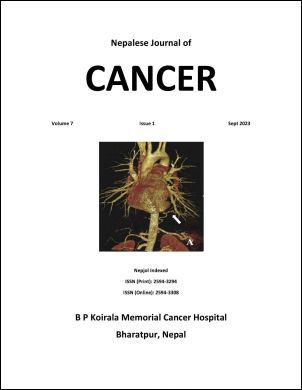Surgical site infection following abdominal cancer surgery: a retrospective study in a tertiary care cancer hospital
DOI:
https://doi.org/10.3126/njc.v7i1.60022Keywords:
Surgical site infection, SSI, Abdominal surgery, cancer surgeryAbstract
Background: Surgical site infections (SSIs) are significant complications following abdominal cancer surgery, resulting in patient discomfort, prolonged hospitalization, and increased healthcare costs. Despite efforts to mitigate their occurrence, SSIs remain a challenge in healthcare settings, particularly in low- and middle-income countries.
Materials and Methods: This retrospective cross-sectional study aimed to determine the incidence, risk factors, microbiological patterns, and impact of SSIs in patients undergoing open abdominal cancer surgery at a tertiary cancer hospital in Nepal.
Results: A total of 206 patients were included in the study, with an SSI incidence of 35.4%. Superficial SSIs accounted for 87.7% of cases, while 12.2% were deep or organ/space infections. The study explored various risk factors, including patient demographics, wound classification, surgical type, and preoperative conditions, and although certain factors showed associations, none reached statistical significance. Notably, longer surgical duration was linked to a higher risk of SSIs. Patients with SSIs experienced significantly longer hospital stays compared to those without SSIs. The predominant pathogens isolated were Escherichia coli, Staphylococcus aureus, and Citrobacter freundii, many of which displayed multidrug resistance.
Conclusions: These findings highlight the need for tailored prevention strategies, prudent antibiotic use, and enhanced infection control measures in this high-risk population undergoing abdominal cancer surgery.
Downloads
Downloads
Published
How to Cite
Issue
Section
License
Copyright (c) 2023 Nepalese Journal of Cancer

This work is licensed under a Creative Commons Attribution 4.0 International License.
This license lets others distribute, remix, tweak, and build upon your work, even commercially, as long as NJC and the authors are acknowledged.
Submission of the manuscript means that the authors agree to assign exclusive copyright to NJC. The aim of NJC is to increase the visibility and ease of use of open access scientific and scholarly articles thereby promoting their increased usage and impact.




